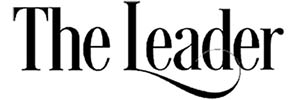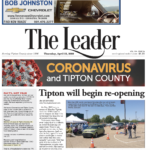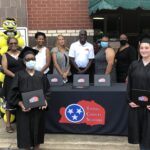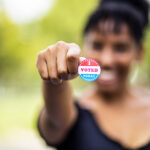
Can you imagine Munford High School quarterback Jordan Bell on a billboard along Highway 51 with his smiling face encouraging Tipton County residents to buy their next truck at Frugal Frank’s Ford Factory?
How about Covington quarterback Braden Gover appearing in a commercial for a local lawyer who’s into taekwondo? Maybe his line would be something like, “Don’t let that lawsuit get you down. Hire a lawyer who kicks back.”
Seem far-fetched? Maybe not.
If you’re a fan of big-time college sports, then you’ve certainly heard a lot of talk lately focused on these three letters: NIL.
It stands for name, image and likeness.
What does it mean? In essence, it’s no longer against the rules for student-athletes to get paid for endorsements. University of Alabama quarterback Bryce Young reportedly has $3.2 in NIL deals. Dozens of other college athletes in various sports are netting millions, quite often as social media influencers.
And just like how the spread offense trickled down from college to high school football in the early 2000s, so has NIL.
Last November, the TSSAA (Tennessee Secondary Sports Athletic Association) Legislative Council unanimously approved changes to Amateur Rule of the TSSAA Bylaws after extensive discussion with the membership at the TSSAA Administrators Meetings in September and Regional Meetings in November.
This is how the TSSAA explained it in a press release: “The change clarifies that students are allowed to receive payment for instructional services and other activities not related to performance provided that they are carried out in a manner that does not suggest or reasonably suggest the endorsement or sponsorship of the TSSAA school. The student’s activities for which they are compensated may not include an image or likeness of the student in a uniform, or other clothing or gear depicting the name or logo of the TSSAA member school the student is attending or has attended. No reference to TSSAA accolades or championships may be used in the student’s activities for which they are compensated.”
Allow me to translate the lawyer-influenced TSSAA speak.
Bell could not wear is Munford football uniform on the billboard, nor could there be any mention of the Cougars winning three straight region titles. Gover could have no lightning bolts on his shirt and there’d be no talk of Covington’s storied history on the gridiron. As long as those rules were followed and a few more, Bell, Gover and any other high school athlete would be free to go get paid.
According to Covington coach J.R. Kirby and Munford coach Slade Calhoun, they’ve heard the idea of popular high school players holding camps or hosting private lessons and pocketing the money, things that used to violate TSSAA rules. Again, there could be no mention of a school and it could not be held on campus. Instead, the player would rely on name recognition. Considering how popular high school football is in Tipton County, it’s easy to imagine.
A quick perusal of social media will reveal players are branding themselves more and more. Munford wideout Isaiah Cobbs recently unveiled his logo on Twitter.
Kirby and Calhoun both said they’re not sure what kind of effect NIL would have on local high school football. Both, however, said they are not going to discourage their players from taking advantage their name, image and likeness for financial gain.
“I told our kids, ‘Go get paid,'” Kirby said. “If you want to make money, go for it. Just be smart about it.
“I don’t know what it’s going to change,” Kirby added, saying that he thinks there will be a very small percentage of kids who will be able to take advantage of the new NIL rules. “We should probably pump the brakes. We live in a reactive society.”
“I’m not going to stop them as long as they follow the rules,” Calhoun said. “I don’t know if it’s going to change anything.”
Any student-athlete who violates the rules will be subject to a 12-month suspension by the TSSAA.
And there’s this from TSSAA: “To avoid the appearance of impropriety, schools or those directly or indirectly associated with the school should refrain from soliciting, negotiating or promoting a student’s participation in activities for which they are compensated.”
Translation: Coaches and administrators can not help their players broker deals.
Kirby and Calhoun both said they have concerns about violations affecting eligibility and the new rules inviting impropriety. There’s no going back now, though.
“I’m sure people are already scheming up to exploit it,” Kirby said. “I’ve gotten calls.”
Said Calhoun: “For all I know, it may already be happening.”
FAQs about NIL from the TSSAA
1. Can an athlete post a link to a business they are receiving payment for sponsoring if there are references to the school in their social media profile where the link appears?
No. References to the school or pictures depicting the athlete in their uniform may not appear in the post containing a link to the sponsoring business.
2. Can a coach or other school official facilitate, coordinate, promote, or negotiate an NIL agreement for a student-athlete enrolled at his/her school?
No. A school can provide generic educational materials or advice regarding the factors that should be considered before entering into an NIL deal but should never be involved with coordinating, facilitating, promoting, or negotiating agreements for student-athletes.
3. Can a booster club or other school support organization make payment to a student-athlete for the use of his or her name, image, or likeness?
No. Payment from a school booster club could reasonably suggest the endorsement or sponsorship of the TSSAA school.
4. Can a school or school support organization distribute money for services to a student through a Name, Image Likeness Collective?
No. School association with a collective would be considered express or implied sponsorship or endorsement of the activity.
5. If an athlete wishes to give private lessons or run a mini camp using school facilities and advertises the lesson or camp, is he/she in violation of the Amateur Rule by mentioning the school as the host site in the advertisement?
Yes. Students may receive payment for activities not related to performance provided that they are carried out in a manner that does not suggest the endorsement or sponsorship of a TSSAA school. To avoid the inference or suggestion that the school endorses or sponsors the activity, the school should not be mentioned in the advertisement. The student may, of course, inform those who contact him or her about the location of the lessons or camp, but that location – if it is a member school – should not be mentioned in any advertisement. If a student is using a school’s facility for instructional purposes, he or she should be treated the same as any member of the student population regarding usage agreements, fees, etc.
6. Are there limits as to how much an athlete can make from an endorsement or sponsorship?
No.
7. Are there limits as to how much an athlete can charge for giving lessons or putting on a camp?
No.
8. Can a coach of a school assist an athlete who is giving lessons or putting on a camp?
No. A coach’s assistance would reasonably suggest support or endorsement by the school.
9. Are there restrictions as to the types of businesses athletes can sign NIL agreements with?
Not at this time.
10. Would it be a violation if an athlete and his/her family were offered a residence as a result of an NIL agreement after he/she had enrolled in and attended a school?
This would be a recruiting violation if a school was involved.
11. Does a school have to document its athletes’ NIL activities?
Not for the purposes of TSSAA. However, school officials may wish to maintain an awareness of those activities in order to ensure that the activities do not suggest the endorsement or sponsorship of the school.
12. If a coach is contacted by a community member seeking a pitcher/receiver/setter/etc. to provide lessons to their child, could the coach direct them to one of his/her players?
No. A coach directing someone to one of his/her players for this purpose would reasonably suggest endorsement or sponsorship of the school.






Leave a Reply